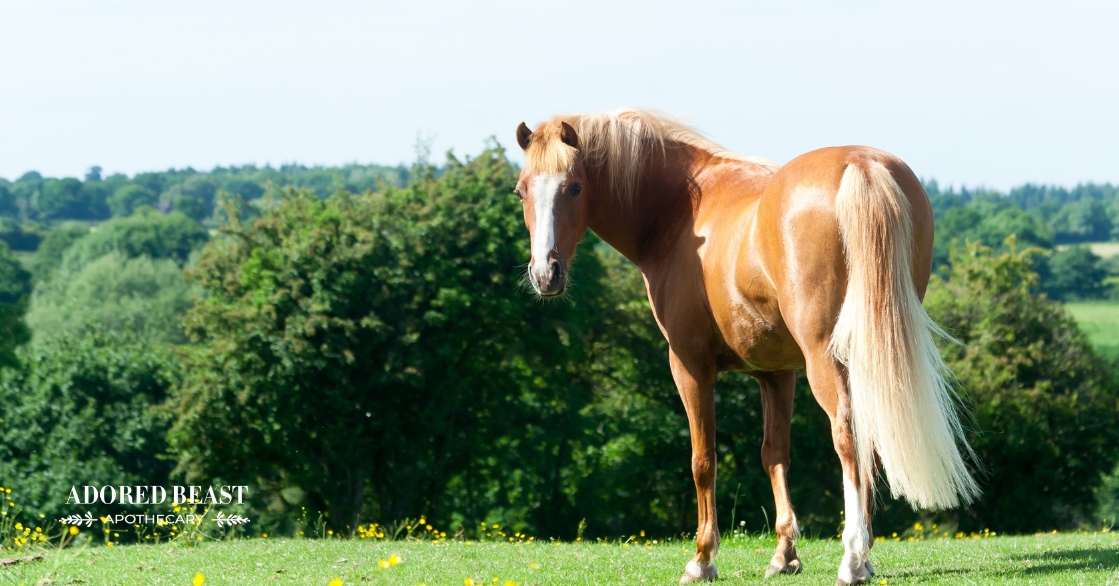Bugs are a pain. And when it comes to horses, some of our equines are “bugged” more than others.
This is especially true if they suffer from sweet itch!
Sweet itch is an allergic reaction to insect bites from black flies, gnats, and mosquitoes. Also known as equine insect hypersensitivity, it causes severe itching and can occur anywhere the horse is bitten. The most common areas are the belly, the dock of the tail, and the mane. If your horse is rubbing out its mane or tail during the summer, this might be the issue. Sweet itch usually subsides in winter when bugs aren’t active.
For severe cases, conventional treatments involve antihistamines and corticosteroids (mainly a drug called dexamethasone). Unfortunately, these medications can cause serious side effects, especially the regular use of corticosteroids which are linked to neurological symptoms, gastric ulcers, insulin resistance, and laminitis. (1) (2) (3) What’s even more troublesome, however, is that current research tells us that skin disease is heavily related to gut health – and throwing gut-altering drugs at the problem is a short-sighted intervention that could lead to very serious problems.
So, if your horse tends to “over” react to a bug bite, what alternatives are there? I’m so glad you asked!!
Risk Vs. Benefit of Conventional Treatment
In holistic terms, when we are looking at the order of importance in disease processes, we take into consideration how life-threatening the issue is. Skin disease is not a life-threatening issue, however, it can be extremely uncomfortable and alter an animal’s quality of life in a significant way. On the flip-side, gastric ulcers and laminitis sit in the number 1 and number 2 spots for most common causes of death in horses, so….. we really have to take this to heart when making decisions for our horses.
Skin sensitivity and inflammatory disease are now being recognized as being linked to internal health, particularly to the gut. The skin microbiome can suffer if the gut microbiome is not healthy. The microbiome produces a number of chemicals that actually modulate our immune system, including short-chain fatty acids that help to modulate inflammation throughout the body. When the microbiome is in poor health, this can leave a horse compromised and not able to handle environmental stressors, eg. bug saliva on the skin, in the case of sweet itch. Ensuring that your horse is getting all the things they need to maintain a healthy gut it imperative with any inflammatory disease, and skin disease is no different.
Learn more about how to help your horse’s gut by reading my Equine Gut Health blog.
Solving Sweet Itch: Alternatives to Conventional Drugs
There are a number of ways that you can help to keep your horse comfortable during the bug season without using potentially harmful medications. Here are my top tips for summer bug and skin management:
1. Diet
Cleaning up your horse’s diet, removing starch/sugar, increasing fibre, and ensuring they have a wide variety of equine-specific plants to eat is a great way to start. Check out our equine nutrition basics blog for more details.
2. Probiotics and Focusing on Gut Health
Adding pre and probiotics, including equine-specific strains, to your horse’s food can make a big difference when it comes to skin health. Be sure to use as many different probiotic strains as possible and high-quality prebiotics as well.
3. Good Quality Fly Protection
Fly sheets and necks that allow your horse’s skin to breathe is really important. If the material is too heavy and you notice your horse is sweating, consider buying a fly sheet made of different material. When your horse sweats, it changes the skin’s pH and can cause more sensitivity to bug bites for sensitive horses. The Horseware Rambo and Weathabeeta fly sheets are the most breathable and lightweight ones that I’ve found that keep sweating to a minimum while offering good protection.
4. Natural Fly Spray
Consider changing from a chemical/pyrethrin-based fly spray to a natural fly spray. There are natural sprays that are just as effective as the chemical versions and can also help to soothe the skin. Click here for my favourite one (Canada only).
5. Gentle Shampoo
Using a gentle shampoo on the mane and tail and any affected areas can really help reduce the itch. Consider a castile or coconut-based shampoo and only apply to affected areas so that you are not disturbing the skin microbiome. This will help to make your horse more comfortable. Click here for my favourite shampoo for sensitive horses. For added skincare, use a skin balm (see below).
6. Protecting and Healing Affected Areas
For extra protection from bugs attacking already-affected areas that are sore or weeping, use an oil-based balm. An added bonus would be if the balm contains calendula oil and bug-deterring essential oils. I also apply this to the base of the mane and the dock of the tail to deter insects and provide itch-relief and a barrier to allow the skin to heal. Click here to see the product I use.
It’s always important to assess the risk of medications vs. their benefit. My criteria is that if my horses are mildly itchy but have good quality of life, good energy, are eating normally, and not stressed, I avoid adding medications. If the case is very severe, you might want to consider using medications for the short term, but always ensure that you have a long term plan in place for reducing or elimination harmful drug input.
References
3. Equine Veterinary Education: Glucocorticoid therapy and the risk of equine laminitis, 2013












